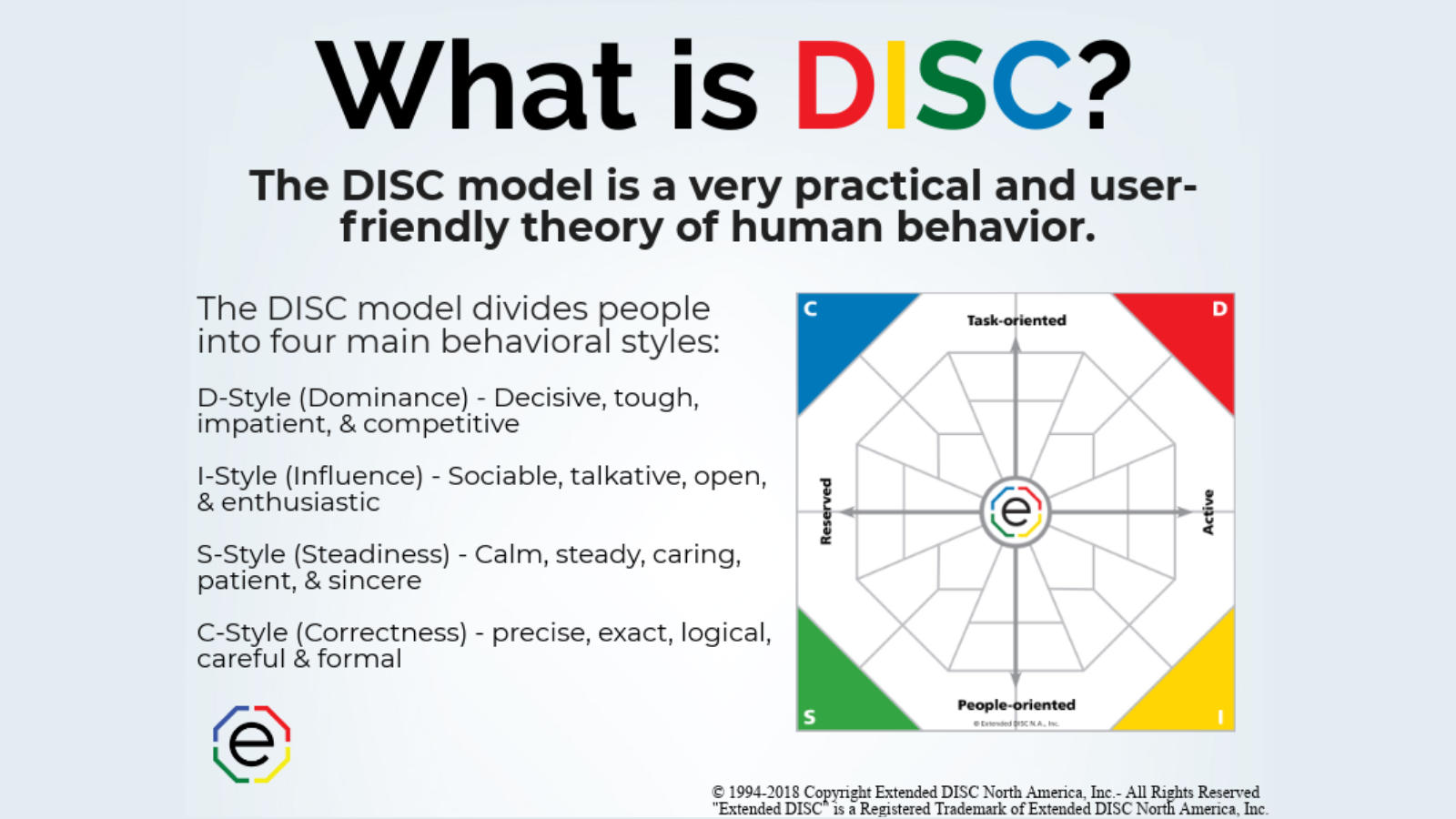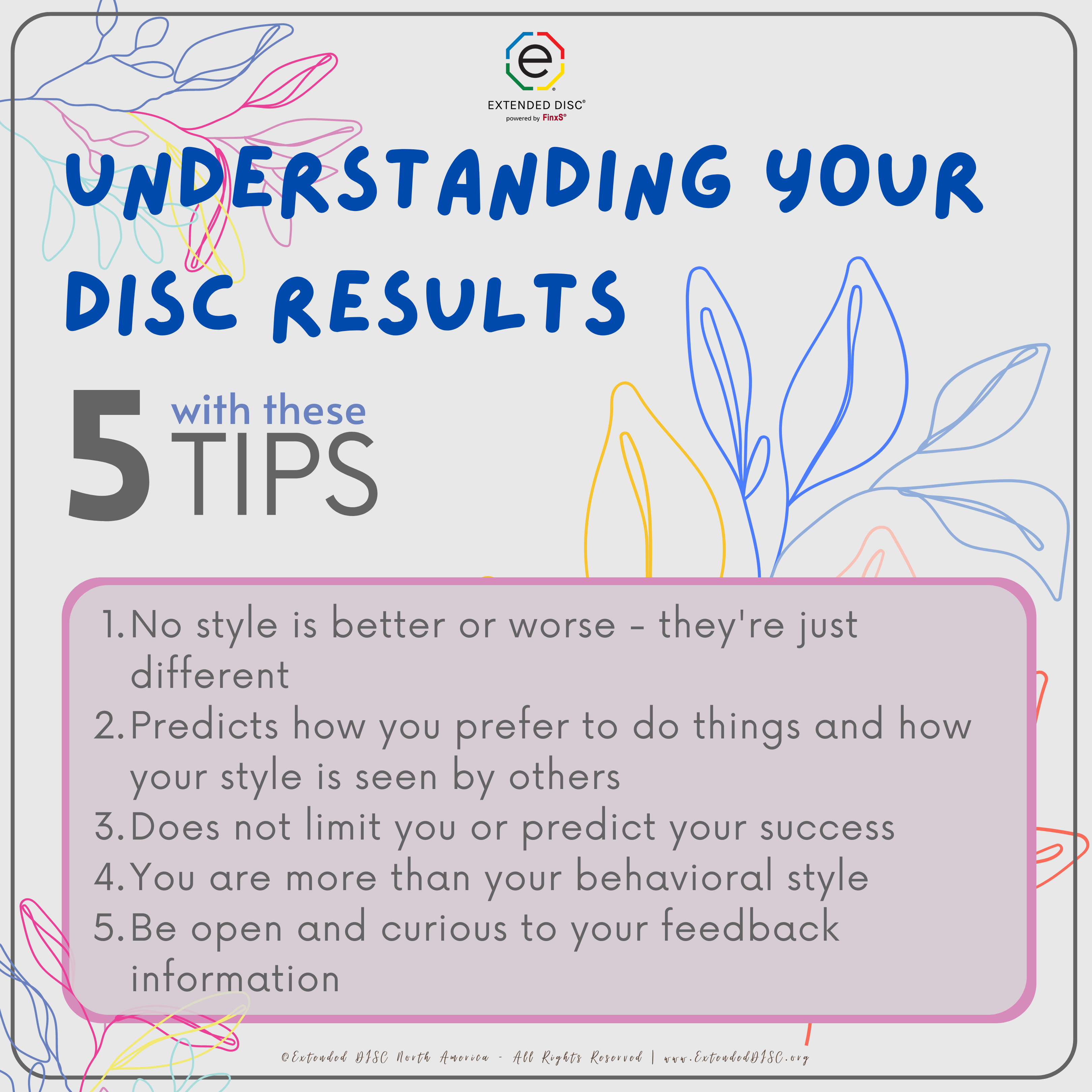DISC has valuable information in supporting your success, but where do you start? How do you effectively interpret the results? Start here!
DISC is new and interesting; however, you may feel overwhelmed with all the information included in the Extended DISC® reports. Here are 5 essential tips to help you break down the information into action items. After all, it's how you apply the information that supports your success.
None of the styles are better or worse
 There are 4 main DISC styles. None of the styles are better or worse; they are simply different. All styles have their own strengths and their areas of development. They are identified by their orientation toward task or people and preference for being active or reserved.
There are 4 main DISC styles. None of the styles are better or worse; they are simply different. All styles have their own strengths and their areas of development. They are identified by their orientation toward task or people and preference for being active or reserved.
D-styles and C-styles tend to be more task-oriented and the I-styes and S-styles tend to be more people-oriented. There are not right or wrong preferences. It's not to say that D-styles and C-styles only focus on task and cannot focus on people. The same is also true for I-styles and S-styles who prefer to focus on people; it doesn't mean they cannot focus on task.
Here's a simple way to see if you prefer task over people or vice versa. Do you tend to say "I need the final report by 5 p.m. today. Oh, by the way, hi, how are you?" or do you tend to say "Hi, how are you? Oh, by the way, I need the final report by 5 p.m. today." There's no better or worse approach and both approaches get to the same result. The difference simply illustrates a person's preference to focus on task or people.
The other identifier is the preference toward being active or reserved. Think about your pacing. Do you prefer a fast-paced environment or one that is a slower-paced? Do you prefer understanding the details before moving into action or do you prefer just to act? Again, there is no right or wrong. These are simply preferences that everyone has. What is your preference?
Predicts how you prefer to do things and how your style is seen by others
 As mentioned previously, DISC predicts your natural preferences or how you comfortably prefer to go about the day. However, your style does not limit what you can accomplish or how successful you can be. It simply predicts how you tend to do things.
As mentioned previously, DISC predicts your natural preferences or how you comfortably prefer to go about the day. However, your style does not limit what you can accomplish or how successful you can be. It simply predicts how you tend to do things.
You can find all four styles represented by very successful people. However, the most successful people know who they are. They have confident self-awareness. They strategically leverage the strengths of their style while recognizing and developing their challenges. In addition, they modify their style appropriately with different people and in different situations. At the end of the day, they aren't changing who they are. Rather, they are making temporary, brief adjustments for the success of the interaction.
Confident self-awareness also means knowing how others see someone with your DISC style. This awareness allows you to determine the right behavior for the situation and person you are interacting with. Are you aware of how others tend to see you?
Does not predict your success
 Your DISC style does not predict whether you will be successful or not. DISC provides you with information in your development and awareness to make better decisions. It also does not limit your ability to develop in another direction or work environment. You can be success in anything you set your mind to; DISC helps predict what will be more comfortable and what will take more energy for you. It is also not designed to be an excuse. You have things you do that are outside of your behavioral comfort zone; DISC helps you be better prepared for those challenges.
Your DISC style does not predict whether you will be successful or not. DISC provides you with information in your development and awareness to make better decisions. It also does not limit your ability to develop in another direction or work environment. You can be success in anything you set your mind to; DISC helps predict what will be more comfortable and what will take more energy for you. It is also not designed to be an excuse. You have things you do that are outside of your behavioral comfort zone; DISC helps you be better prepared for those challenges.
DISC provides you with information to create a road map to success. It predicts how you prefer to go about your day. This gives you a starting point on your map. Now you can determine where you need to go on the map. What behaviors are needed, for the situation or other person you are interacting with, to ensure a successful outcome? How will you get there?
DISC gives you these data points to help you be more strategic in your interactions. It is not designed to fix you or assume you need to be fixed. It's designed to give you feedback. Are you open to feedback and how it can help you succeed?
You are more than your style
 DISC doesn't describe all of who you are. DISC doesn't measure your attitudes nor intelligence. It doesn't determine good or bad; better or worse. There are no right or wrong answers. DISC is a self-evaluation. It's a statistical analysis of your responses to the questionnaire; measuring your behavioral tendencies.
DISC doesn't describe all of who you are. DISC doesn't measure your attitudes nor intelligence. It doesn't determine good or bad; better or worse. There are no right or wrong answers. DISC is a self-evaluation. It's a statistical analysis of your responses to the questionnaire; measuring your behavioral tendencies.
You have all 4 DISC styles within you. The Extended DISC® tool measures your natural preference or tendency to one or more of the DISC styles. For example, why do some individuals feel energized after attending a networking event and others feel drained? Or conversely, why do some people feel energized analyzing data and others feel drained? You get the point; it's all about energy.
So, let's imagine you're a hiring manager and two potential job candidates walk into your office. Let's say you pre-determined one of the 4 DISC styles to be ideal for the position. Who would you hire if both candidates were the same style? You can't make this decision based solely on DISC styles. You'd need to look further into their skills, experience, attitude, intelligence, etc. DISC provides you with supporting information therefore, it should never be used as a sole criterion for making decisions.
Be open and curious to your feedback information
 DISC is not just a pretty picture report. There are strong statements within the report to help you better process the information. Statements you agree with generally do not illicit change. DISC is designed to get you thinking; "why would my responses to the questionnaire, generate this statement?" Think about the statement in different contexts. Ask others for feedback about statements you're curious about or have impact on your current situation. Did the statement used to be true; perhaps when I first start in my career?
DISC is not just a pretty picture report. There are strong statements within the report to help you better process the information. Statements you agree with generally do not illicit change. DISC is designed to get you thinking; "why would my responses to the questionnaire, generate this statement?" Think about the statement in different contexts. Ask others for feedback about statements you're curious about or have impact on your current situation. Did the statement used to be true; perhaps when I first start in my career?
Don't overly focus on one profile, one statement, or one word in your report. Remember, focus on the big picture. Do you agree with the majority of the report? Did you uncover any blind spots? How can you use this feedback to improve your interactions? Remember, you are the source of the feedback. You choose whether you will act on it or not. What will you choose?
